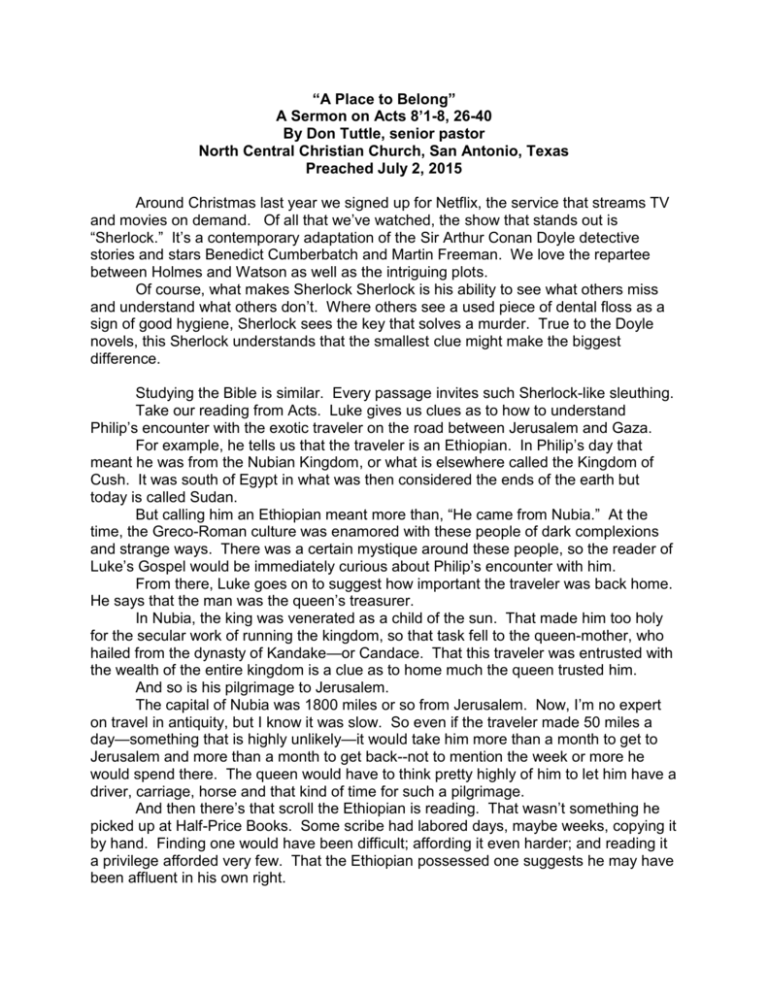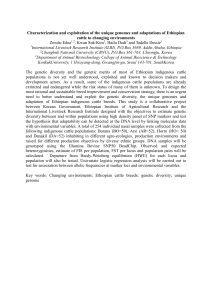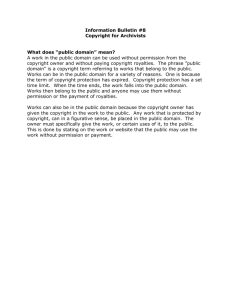Acts 8'1-8, 26
advertisement

“A Place to Belong” A Sermon on Acts 8’1-8, 26-40 By Don Tuttle, senior pastor North Central Christian Church, San Antonio, Texas Preached July 2, 2015 Around Christmas last year we signed up for Netflix, the service that streams TV and movies on demand. Of all that we’ve watched, the show that stands out is “Sherlock.” It’s a contemporary adaptation of the Sir Arthur Conan Doyle detective stories and stars Benedict Cumberbatch and Martin Freeman. We love the repartee between Holmes and Watson as well as the intriguing plots. Of course, what makes Sherlock Sherlock is his ability to see what others miss and understand what others don’t. Where others see a used piece of dental floss as a sign of good hygiene, Sherlock sees the key that solves a murder. True to the Doyle novels, this Sherlock understands that the smallest clue might make the biggest difference. Studying the Bible is similar. Every passage invites such Sherlock-like sleuthing. Take our reading from Acts. Luke gives us clues as to how to understand Philip’s encounter with the exotic traveler on the road between Jerusalem and Gaza. For example, he tells us that the traveler is an Ethiopian. In Philip’s day that meant he was from the Nubian Kingdom, or what is elsewhere called the Kingdom of Cush. It was south of Egypt in what was then considered the ends of the earth but today is called Sudan. But calling him an Ethiopian meant more than, “He came from Nubia.” At the time, the Greco-Roman culture was enamored with these people of dark complexions and strange ways. There was a certain mystique around these people, so the reader of Luke’s Gospel would be immediately curious about Philip’s encounter with him. From there, Luke goes on to suggest how important the traveler was back home. He says that the man was the queen’s treasurer. In Nubia, the king was venerated as a child of the sun. That made him too holy for the secular work of running the kingdom, so that task fell to the queen-mother, who hailed from the dynasty of Kandake—or Candace. That this traveler was entrusted with the wealth of the entire kingdom is a clue as to home much the queen trusted him. And so is his pilgrimage to Jerusalem. The capital of Nubia was 1800 miles or so from Jerusalem. Now, I’m no expert on travel in antiquity, but I know it was slow. So even if the traveler made 50 miles a day—something that is highly unlikely—it would take him more than a month to get to Jerusalem and more than a month to get back--not to mention the week or more he would spend there. The queen would have to think pretty highly of him to let him have a driver, carriage, horse and that kind of time for such a pilgrimage. And then there’s that scroll the Ethiopian is reading. That wasn’t something he picked up at Half-Price Books. Some scribe had labored days, maybe weeks, copying it by hand. Finding one would have been difficult; affording it even harder; and reading it a privilege afforded very few. That the Ethiopian possessed one suggests he may have been affluent in his own right. 2 All these clues suggest the traveler was a person of substance. If he were around today he might-well live here in Stone Oak, drive a Lexus and work in a corner office downtown. He’d be one of those people who’s made it, who’s “living the dream,” so to speak. And yet there’s one clue that suggests all is not well with the Ethiopian. Luke tells us he’s a eunuch. The term Luke uses can mean either “an official” or a “castrated male.” The fact that Luke uses “official” later in the sentence suggests he has the second meaning in mind here. That would not be surprising. In the ancient world, male servants who oversaw the king’s harem or worked near the queen were castrated. The queen’s treasurer would certainly fall into that category. But being a eunuch meant the traveler was a perpetual outsider. No matter how much the king or queen trusted him, he could never be anything more than their servant. Away from work, he would never have a wife to welcome him home or children to bounce on his knee. He would even be an outsider in the religion he wanted to practice. According to Deuteronomy 23, a eunuch could never become a Jew and enjoy the privileges of the Jewish people. The best he could do was be a God-fearer, a Gentile who lived by the Laws of Moses but could get no closer to God’s presence than the outer courts of the Temple. Despite all the Ethiopian had—the mystique, the position, the wealth—the one thing he didn’t have—could never have--was true acceptance. No matter what he was or what he did, he would always be on the outside looking in. He would never really belong. And I wonder if that too wouldn’t make him feel right at home in our day. Of course, the need to belong has always been universal. Plato spoke of it in terms of citizenship and nationalism; and Aristotle called us “political beings,” meaning that we were created to live in relationships. Shakespeare reflected on it in “Romeo and Juliet” with the lovers torn between belonging to family or each other. His contemporary, John Donne, recognized the need to belonging when he wrote: No man is an island, Entire of itself, Every man is a piece of the continent, A part of the main. Centuries later Freud insisted the need to belong arose from our need to reproduce, while Maslow placed it just above survival and safety in importance. What they knew is what we know, we all need to belong. We need acceptance and affirmation. And yet how many “Ethiopians” are there among our neighbors? How many apparently successful people are secretly longing for acceptance they can’t earn? Or how many young people would identify with contemporary artist and poet Lang Leav. In “Love and Misadventure,” she wrote: Shrinking in a corner, pressed into the wall; do they know I'm present, am I here at all? 3 Is there a written rulebook, that tells you how to be— all the right things to talk about— that everyone has but me? Slowly I am withering— a flower deprived of sun; longing to belong to— somewhere or someone. Closer to home, how many of us are withering while longing to belong? The need for acceptance is one of the most important needs we have, yet where are we to find it? Luke gives us a clue about that as well. As Philip nears the Ethiopian’s carriage, he hears the traveler reading from the 53rd chapter of Isaiah. That chapter is a so-called Servant Song, a prophetic ode to one who would one day save Israel. But the Ethiopian didn’t know that, and so he invites Philip to join him in the carriage and explain it. And Philip does. He begins with the words from Isaiah and tells the Ethiopian of their fulfillment in Jesus of Nazareth. He tells him how Jesus came from God the Father but was “despised and rejected” by God’s people...how he’d been arrested, tried and crucified—led like a lamb to slaughter...how he’d died for our transgressions and was crushed for our iniquities...how his life was taken from him, so that our wounds might be healed and we might be reconciled to—accepted by—God. Beginning where the Ethiopian was, Philip helped him understand that his longing to belong could never be met by the queen’s approval, a family’s embrace, or even religious devotion. It could only be met by God, the God whose love was not just exemplified in Jesus but is experienced through faith in him. We need only survey the cultural landscape to see that some of our neighbors-and maybe some of us--still need to grasp that truth. I don’t know if you’ve noticed, but one of the big buzzwords today is “community.” The internet offers millions of “communities” for us to join. Newscasters will refer to the African-American or Hispanic, Islamic or Jewish “communities”—as if they were monolithic. And, as our family discovered a few weeks ago, college campuses offer students all sorts of “communities”--Greek, political, religious and social. But the language of community is not coincidental. It is intended to speak to our need to belong. It suggests we’ll find the acceptance we seek in this or that group. But whatever we might find in them, such “communities” can’t offer the acceptance we need because that acceptance comes from God through Jesus Christ. It is only in him that the sin and self-centeredness that keeps us on the outside looking in can be forgiven. It is only in him that we find the relationship that fills the void. As Philip and the Ethiopian continued along the desert road, the Ethiopian spotted a pool of water. And immediately, excitedly he asked, “What prevents me from 4 being baptized?” We shouldn’t be surprised at his question. He had discovered the clue to the acceptance for which he longed. He had come to understand that it was not in power or status, the praise of others or even religious observance. It was in Christ alone. Maybe you or an “Ethiopian” in your life is striving for acceptance. Maybe you are seeking it in family or success, power or possessions. Maybe they are floating from this community to that, hoping that they will finally belong. It’s not going to happen. That’s because the longing we have is ultimately for God. What we seek—what we need—is nothing less than the divine imprimatur, and that comes through faith in Jesus. It is his faithfulness to God, his perfect obedience, that he shares with us, making us acceptable to a holy God. It is through Jesus that God says: “Come. I will welcome you. I will accept you. I will fill your longing to belong.”


